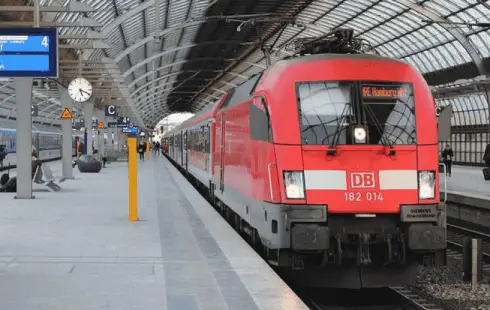
Crypto Investment Entry and Exit Strategies of Institutional Investors
Section: Business
 "The train is cancelled. The reason is short-term illness of the staff. We apologize for any inconvenience." Bad surprises of this kind are becoming more and more common at Deutsche Bahn (DB) stops these days and weeks. A current statistic shows: In the past two years, the state-owned company has never had so many regional trains cancelled due to staff shortages as this spring.
"The train is cancelled. The reason is short-term illness of the staff. We apologize for any inconvenience." Bad surprises of this kind are becoming more and more common at Deutsche Bahn (DB) stops these days and weeks. A current statistic shows: In the past two years, the state-owned company has never had so many regional trains cancelled due to staff shortages as this spring.
9725 trips that did not take place have now been reported by the Federal Ministry of Transport in response to a question from the Left Party parliamentary group for the second quarter of 2022, i.e. for the months of April, May and June. That's twice as many cancellations as a year ago, in the spring of 2021. State Secretary Michael Theurer (FDP), the federal government's commissioner for rail transport, cites "personnel bottlenecks" as the reason. Among other things, these are short-term sick leave and "disposition decisions" (meaning internal deployment instructions).
According to Theurer's statistics, the number of train cancellations has almost tripled compared to the summer quarter of 2020, when 3136 journeys did not take place. Since then, sometimes more, sometimes fewer regional trains have been cancelled - but never as many as this spring. The statistics of the Federal Ministry of Transport are based on information from Deutsche Bahn about its local transport subsidiary DB Regio. According to this, a total of 45,431 regional trains were cancelled between mid-2020 and mid-2022 due to staff shortages.
The extent to which the Corona issue plays a role here is not clear from Theurer's answer to the Left Party. In response to an inquiry from the SZ, the Ministry of Transport referred to Deutsche Bahn. A Deutsche Bahn spokeswoman told the SZ: "Like everywhere in Germany, DB is again affected by rising Corona cases, which can have a regional impact in the short term." However, she said, the railroad has always hired at record levels in recent years, about 20,000 people per year. "This year, DB will actually hire 15 percent more than planned, with around 24,000 job commitments," the spokeswoman said. In addition to compensating for departures, a total of around 4,500 new jobs will be created this year.
This confirms what has already become apparent at the S-Bahn in Hanover and other public companies: Accordingly, numerous employees who have been infected with the corona virus are dropping out in these weeks and months. The Left Party Member of Parliament Bernd Riexinger, a member of the Transport Committee of the Bundestag, sees mainly other reasons. "We are not surprised by this development, since Deutsche Bahn is only paying the future minimum wage of twelve euros to tens of thousands of employees." With this personnel policy, he says, Deutsche Bahn is not an attractive employer.
Riexinger: "We demand that Deutsche Bahn employees be given a fundamentally higher pay scale and thus paid better than the statutory minimum wage. In addition, there needs to be an offensive for additional staff and associated better working conditions." However, this statement is likely to fall short in view of the widespread spread of the corona virus.
The total number of cancelled regional trains is probably much higher. On the one hand, this is because the statistics of the Ministry of Transport only refer to DB Regio, but private rail companies are now also operating on the tracks of the state-owned DB in many federal states. On the other hand, train cancellations are also increasing at present due to the poor condition of the rail network in some cases. These cancellations are not recorded in the statistics of the Ministry of Transport.
According to these statistics, 0.3 percent of Deutsche Bahn's regional trains were cancelled this spring due to staff shortages. 0.3 percent doesn't sound like much, but there were a total of 9725 connections in 91 days. That's more than 100 regional trains a day.
Image by Jonas Reichard

Section: Business

Section: Arts

Section: Arts

Section: Business

Section: Business

Section: Arts

Section: Health

Section: Arts

Section: News

Section: News
Health Insurance in Germany is compulsory and sometimes complicated, not to mention expensive. As an expat, you are required to navigate this landscape within weeks of arriving, so check our FAQ on PKV. For our guide on resources and access to agents who can give you a competitive quote, try our PKV Cost comparison tool.
Germany is famous for its medical expertise and extensive number of hospitals and clinics. See this comprehensive directory of hospitals and clinics across the country, complete with links to their websites, addresses, contact info, and specializations/services.
One of the most beautiful squares transforms into a summer stage every year for two days. The Gärtnerplatz Open-Air features a free music and cultural program across three stages, as well as street food from local vendors. On Saturday, the main stage at Gärtnerplatz offers something for everyone,...



No comments yet. Be the first to comment!